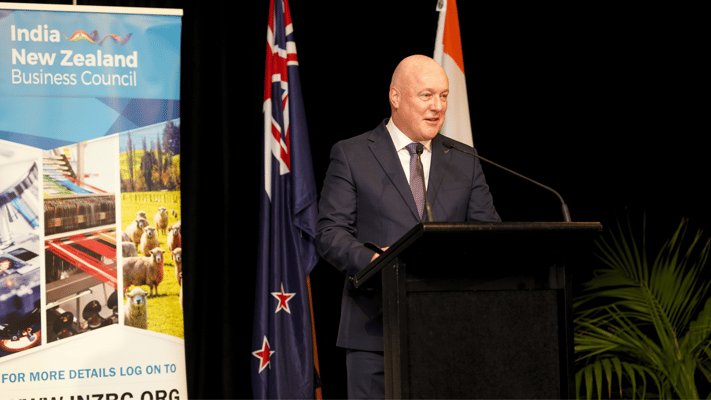PM Luxon Hails Kiwi-Indians’ Contribution To New Zealand

"Kiwi-Indians are, on average, younger, better educated, and earn more than the general New Zealand population," Prime Minister Christopher Luxon said he told Prime Minister Modi during his visit to India, praising the country’s third-largest ethnic group.
Speaking at a strategy and trade dialogue, a meeting focused on the India-New Zealand relationship, hosted by the India New Zealand Business Council (INZBC) at Auckland’s Pullman Hotel on May 9, Luxon spoke in light of discussions with PM Modi during his India visit.
“New Zealand’s Indian community was a key feature of many of my discussions in India, including with Prime Minister Modi,” Luxon shared.
Luxon's recent visit to India from March 16–20, 2025, was described as a significant step in strengthening bilateral ties, with discussions around a Free Trade Agreement also underway.
“Prime Minister Modi praised New Zealand’s Indian diaspora, referring to it as a ‘living bridge’ between our countries,” he added.
Recognising the Indian community’s contribution, Luxon noted that India is now the largest source of skilled migrants in New Zealand and the second-largest source of international students.
“In short, Indian-Kiwis are making a massive contribution to New Zealand.”
He also highlighted his visits to Hindu and Sikh temples in India as gestures of respect to Kiwi-Indians, saying, “I made sure that my programme in India reflected and respected the deep cultural links between our countries.”
Cricket, a shared passion between both nations, also featured in Luxon’s remarks.
Calling it an “indispensable element” of the India, New Zealand partnership, he recalled his visit to Mumbai’s Wankhede Stadium with Mumbai-born Black Caps spinner Ajaz Patel, who famously took the third-best bowling figures in Test cricket history at the venue.
Luxon and Modi also discussed expanding cooperation across multiple sports.
“I was particularly pleased to witness the signing of a Sports Memorandum of Cooperation between New Zealand and India,” he said.
“This arrangement allows us to develop new ways to collaborate across high-performance sports, exchange programmes, skills, technology and innovation, research, and people.”
"Kiwi-Indians are, on average, younger, better educated, and earn more than the general New Zealand population," Prime Minister Christopher Luxon said he told Prime Minister Modi during his visit to India, praising the country’s third-largest ethnic group.
Speaking at a strategy and trade...
"Kiwi-Indians are, on average, younger, better educated, and earn more than the general New Zealand population," Prime Minister Christopher Luxon said he told Prime Minister Modi during his visit to India, praising the country’s third-largest ethnic group.
Speaking at a strategy and trade dialogue, a meeting focused on the India-New Zealand relationship, hosted by the India New Zealand Business Council (INZBC) at Auckland’s Pullman Hotel on May 9, Luxon spoke in light of discussions with PM Modi during his India visit.
“New Zealand’s Indian community was a key feature of many of my discussions in India, including with Prime Minister Modi,” Luxon shared.
Luxon's recent visit to India from March 16–20, 2025, was described as a significant step in strengthening bilateral ties, with discussions around a Free Trade Agreement also underway.
“Prime Minister Modi praised New Zealand’s Indian diaspora, referring to it as a ‘living bridge’ between our countries,” he added.
Recognising the Indian community’s contribution, Luxon noted that India is now the largest source of skilled migrants in New Zealand and the second-largest source of international students.
“In short, Indian-Kiwis are making a massive contribution to New Zealand.”
He also highlighted his visits to Hindu and Sikh temples in India as gestures of respect to Kiwi-Indians, saying, “I made sure that my programme in India reflected and respected the deep cultural links between our countries.”
Cricket, a shared passion between both nations, also featured in Luxon’s remarks.
Calling it an “indispensable element” of the India, New Zealand partnership, he recalled his visit to Mumbai’s Wankhede Stadium with Mumbai-born Black Caps spinner Ajaz Patel, who famously took the third-best bowling figures in Test cricket history at the venue.
Luxon and Modi also discussed expanding cooperation across multiple sports.
“I was particularly pleased to witness the signing of a Sports Memorandum of Cooperation between New Zealand and India,” he said.
“This arrangement allows us to develop new ways to collaborate across high-performance sports, exchange programmes, skills, technology and innovation, research, and people.”










Leave a Comment